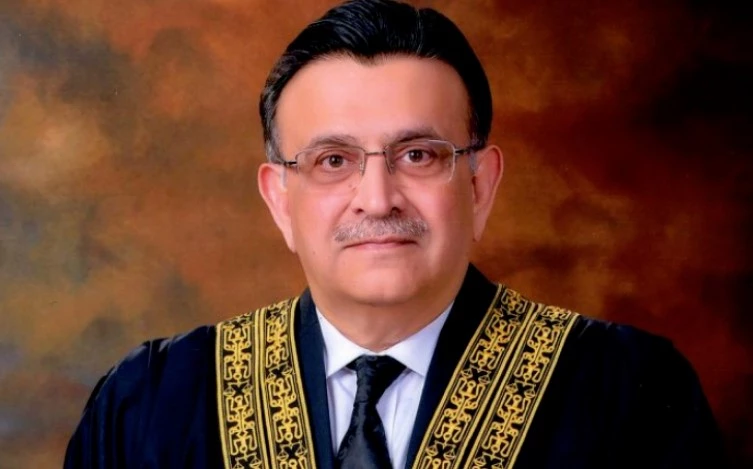Supreme Court adjourns hearing of pleas against military trials of civilians

Stay tuned with 24 News HD Android App

The Supreme Court has adjourned the hearing of petitions challenging the military trials of civilians until Friday while directing Attorney General of Pakistan Mansoor Usman Awan to seek directives from the federal government regarding the right of appeal in the military courts, reported 24NewsHD TV channel.
A six-judge larger bench on Wednesday resumed hearing of a set of pleas against the military trials of civilians suspected of involvement in May 9 vandalism. Chief Justice of Pakistan Justice Umar Ata Bandial is heading the larger bench which consists of Justice Ijazul Ahsan, Justice Munib Akhtar, Justice Yahya Afridi, Justice Sayyed Mazahar Ali Akbar Naqvi and Justice Ayesha A Malik.
On Tuesday, the apex court had rejected the federal government’s request to constitute a full court bench to hear a set of pleas challenging the trial of civilians in the military courts. CJP Bandial told the AGP: “Judges are not available at this time. It is not possible to form a full court.”
The AGP, however, again during Wednesday’s proceeding urged the apex court to constitute a full court for the case.
Resuming his arguments today, AGP Awan said that the violent incidents of May 9 had caused losses of Rs2.5 billion, including Rs1.9 billion to military installations, as he again called for the formation of a full court.
The AGP came to the rostrum and informed the larger bench that the attack on the Lahore Corps Commander House took place at 5:40pm, noting that all attacks on military installations took place “approximately at the same time”.
“On May 9, sensitive military installations were attacked between 3pm and 7pm,” he said and added a wall was demolished at the Mianwali airbase where aircraft were parked, adding fuel for the planes was also present there at the time.
The AGP said that the office of the Inter-Services Intelligence’s (ISI) Hamza Camp in Rawalpindi and the Armed Forces Institute of Cardiology were also attacked by rioters. “Violent incidents also took place at Rawalpindi’s Chaklala,” he said, adding petrol bombs were also used. The AGP also showed pictures of people entering General Headquarters Rawalpindi as well as images of miscreants wearing the Lahore Corps Commander’s uniform.
AGP Awan said a Canteen Store Department (CSD) store was set ablaze in Lahore and armed miscreants were also involved in attacking the Faisalabad ISI office.
He, however, said “On May 9, the situation in Sindh and Balochistan was under control.”
“Are you saying that army officers only know how to shoot?” CJP Bandial asked. At this, AGP Awan said that army officers were not taught how to disperse such crowds. Sensitive military installations, including the Lahore Corps Commander House, GHQ and airbases, were attacked in a “systematic manner”, he said.
“The events of May 9 did not happen suddenly, they were carried out in a systematic manner,” the AGP said as he again requested for a full court bench to hear the pleas against military trials of civilians.
The attorney general contended that such an incident had never before taken place in the country’s history. Talking about the Liaqat Hussain case, which was also referenced during previous arguments by the petitioners’ lawyers, he said that the crime was civilian in nature. “Even in the 21st Amendment [case], the crime was of a civilian nature,” he said.
At this, Justice Naqvi interjected and said that the case concerning the 21st Amendment was completely different. “Military courts were established through a constitutional amendment,” he said.
“You are saying that it is the first time the people attacked military installations,” the CJP remarked. He also asked AGP Awan to talk about the points raised by the petitioners. “What is the punishment in military courts under Section 7 of the Army Act?” he asked.
“Under Sections 3 and 9, the punishment in military courts is two years imprisonment,” the AGP responded. “Is that the maximum punishment?” the CJP asked, to which the AGP replied in the affirmative. “Then the punishment in ordinary courts is more,” Justice Bandial observed, adding that there were more severe punishments under civil laws.
Justice Akhtar then said that the data and facts as well as the allegations put forth by the attorney general were “very serious” in nature. “Entering a prohibited area is also a crime,” he said, adding that Section 3 of the Army Act would be applicable in this case.
Justice Bandial then remarked that there was an element of “seriousness” regarding the events of May 9. “In my memory, there is no such incident where institutions were attacked across the country,” he observed.
He told the AGP to assure the court that fair trial and processes would be followed before giving arguments on the constitutional aspect of the case. “Certainly, the court will not allow something that is unconstitutional,” he said. “If the right of appeal is to be given in a trial under the Army Act, then give it through legislation,” Justice Afridi said. CJP Bandial remarked that the AGP would have to satisfy the court that the right of appeal would be given.
“The question is whether or not one will have the right to appeal in a court created under the Constitution,” Justice Afridi said.
Justice Bandial then observed that Indian spy Kulbhushan Jadhav was given the right of appeal, to which the AGP said that the “alien” was given the right through legislation.
“Is he ‘alien’ or Indian? The word alien has other interpretations,” Justice Ahsan remarked with a smile.
CJP Bandial then asked the AGP to seek instructions from the government regarding whether a right of appeal would be given or not. The AGP said he would be able to seek instructions in this regard by Friday.
Reporter Amanat Gishkori
